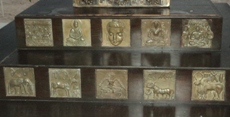A group of people in Hithadhoo, Addu City, have set fire to the allegedly “idolatrous” Pakistani monument erected for the SAARC summit in the early hours of the morning.
Police Sub-Inspector Ahmed Shiyam confirmed that the incident occurred before dawn today, and the perpetrators escaped before police arrived at the scene.
It is believed that the group threw objects lit with petrol and burnt one side of the monument, Shiyam explained, adding that no arrests have been made yet and police are investigating the act of arson.
According to an eyewitness in the Hithadhoo Power Park restaurant last night, which is located next to the monument, a group of people first attempted to torch the monument using petrol around 11pm.
However, their attempts were unsuccessful and the fires were quickly put out by Hithadhoo residents at the area.

Meanwhile, two young men who toppled the monument during an earlier protest led by members of opposition parties last Wednesday remain in custody, facing charges of damage to private property.
The protesters contended that the monument featured “idols and objects of worship” and demanded it be taken down.
The monument, which features engraved symbols of ancient civilisation of Pakistan and a bust of the country’s founder Mohamed Ali Jinah, had been removed by the Addu City Council last Tuesday night but was replace back on its plinth with a cover ahead of Thursday’s unveiling ceremony.
Monuments representing the eight SAARC nations were erected across Addu City and unveiled by heads of state and government during the summit.
A large crowd of Hithadhoo residents gathered for the official unveiling by Pakistani Prime Minister Yousaf Raza Gilani, after which they took photographs in front of the monument.
A member of the Pakistani delegation at the unveiling ceremony explained to Minivan News that the monument represented artifacts of the ancient Indus Valley civilisation and were not specifically religious symbols.
News that the monument represented artifacts of the ancient Indus Valley civilisation and were not specifically religious symbols.
Following the first attempt to vandalise the monument, a second member of the Pakistani delegation told Minivan News that they approached the Foreign Ministry over the incident but was informed by an official that it had not occurred, and was a rumour spread by the opposition.
Foreign Minister Ahmed Naseem said yesterday that the delegation had not expressed concern to the Foreign Ministry, and noted that besides prosecuting those responsible for the damage, there was “little we can do.”
The attacks on the monument, said Naseem, had been instigated by people with “strange ideas”. He observed that there were statues of Buddhas in the National Museum in Male’. “Some people are not happy, but I’m not too excited about it,” he said.
“Illegal”
Hithadhoo Councillor Hussein Hilmy explained that the monument was “designed and built by Pakistan”, and that the City Council had helped erect the monument.
Islamic Minister Dr Abdul Majeed Abdul Bari was not responding at time of press and officials at the ministry did not respond to inquiries today. Bari however told local media last week that the monument was “illegal” as it “represented objects of worship of other religions.”
Bari said he had discussed the matter with the Pakistani High Commission and requested it be taken down at the end of the summit.
Meanwhile, Adhaalath Party President Sheikh Imran Abdulla told Minivan News today that the monument “should not be kept on Maldivian soil for a single day” and “should be removed immediately.”
 “We believe it conflicts with the constitution of the Maldives, the Religious Unity Act of 1994 and the regulations under the Act,” he said.
“We believe it conflicts with the constitution of the Maldives, the Religious Unity Act of 1994 and the regulations under the Act,” he said.
The monument was “illegal” because it depicted “objects of worship” that “denied the oneness of God,” he explained.
Imran contended that the engravings on the monument represented objects of worship for “a lot of other religions.”
The religious conservative party has asked the Prosecutor General’s Office today to take legal action, he revealed.
In a statement condemning the “idolatrous” monument, the Adhaalath Party’s Hithadhoo branch claimed that “no Maldivian of sound mind” would allow idols or iconography of other religions to be erected in the country.
The Pakistani monument was “part of efforts by adversaries of Islam to turn the faith that Maldivians embraced 900 years ago upside down,” the statement reads.
The party noted that under section six of the religious unity regulations, public displays of “symbols or slogans belonging to a religion other than Islam” were illegal, and called on those responsible for erecting the monuments to be “brought before the law protecting religious unity.”